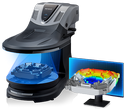Plastics
Plastics are artificially produced substances - macromolecular chains - that have different properties depending on the type of plastic - e.g. solvent resistance, heat resistance, flexibility, strength,.... Today, there are many types of plastics and it is always necessary to choose the most suitable type for a given application. In recent years, manufacturers have been experimenting with organic fillers - e.g. a composite of plastic and wood.
- are formed by chemical reactions
- are made up of macromolecules with a large number of atoms - assembled into chains
- are flexible, strong and tough
- can be composite to improve the desired properties (glass, carbon, stainless steel fibers, talc, glass beads,....)
- can be additivated with various substances (UV stabilisers, plasticizers, flame retardants,....)
- can be almost any colour
Plastics are classified according to their reaction to heat:
a) thermoplastics (thermoformable)
They soften when heated and harden again when cooled - changes are reversible. They can be recycled and reused. e.g.: ABS, PA, PBT, PC, PE, PMMA, POM, PP, PS, PVC, SAN, TPE
We process most thermoplastics, if required we can help you select the right type of material for your application.
Most plastics can be coloured to your requirements in almost any colour.
b) reactive plastics (heat hardenable)
When heat is applied, a chemical reaction takes place and the plastic hardens, changing irreversibly into non-melting state - e.g. Bakelite.


